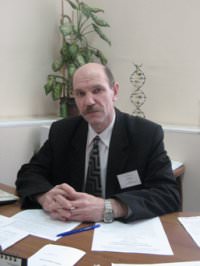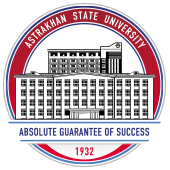Chemical Faculty

Tyrkov, Alexey Georgievich
D.Sc. in Chemistry, Full Professor – Dean
E-mail: tyrkov@rambler.ru
QUESTIONS & ANSWERS
Are international student programs available at the Chemical Faculty?
Our Faculty is actively developing its worldwide links – in particular, with our colleagues in Grenoble and in Lille (France), in Siegen (Germany), and with the Ca’ Foscari University of Venice (Italy). While our students study, they choose a foreign language to learn – French, English, German, Japanese, or Chinese. That helps them take part in various international contests, whose winners get an opportunity to cover a training program at a non-Russian university. Some of our students have already covered such training in Venice, in Lille, or in Grenoble. Every year our students win grants to cover language training at an international linguistic camp in France. Some of them have won a grant to cover a master program in Lille. Our students go outside Russia frequently and enhance their language skills; they make friends with their peers from the most different countries of Europe.
What specializations are available at the Chemical Faculty?
You may cover the following programs: “Petrochemistry”, “Environmental Chemistry, Chemical Expertise, & Ecological Safety”, “Organic & Bioorganic Chemistry”, and “Teacher of Chemistry”. If you study part-time, you may also cover the program “Medical & Pharmaceutical Chemistry”.
Where do your alumni work?
With enterprises of petrochemical profile, with chemical analytical and ecological chemical labs, with corporate chemical labs and departments, with centers of products and goods certification and recertification, with enterprises of pharmaceutical profile, with research institutes, and with educational institutions.
Is it possible to learn a foreign language studying at the Chemical Faculty?
Sure, any language is available. I’d say even more. In 2015, we’re delivering a joint Russian-French master program. Its graduates shall get a double diploma (a French diploma and a Russian diploma issued by ASU).
What’s the difference between the specialization “Chemistry” and the specialty “Fundamental & Applied Chemistry”?
The specialization “Chemistry” implies two-stage education: the bachelor stage (4 years to study) plus the master stage (two years more), which is six years total. As for the specialty “Fundamental & Applied Chemistry”, it implies a single five-year educational process, after which you may sign up for a master program, if you wish. There are no substantial differences between the specialization “Chemistry” and the specialty “Fundamental & Applied Chemistry”.
If I wish to become a teacher of Chemistry and Biology, what specialization should I choose?
You may enter the Chemical Faculty and then choose the extra profile “Teacher of Biology”. Another option for you is to enter the Biological Faculty and then choose the extra profile “Teacher of Chemistry”.
What labs does the Chemical Faculty have?
We have the following labs: Inorganic Chemistry, Analytical Chemistry, Organic Chemistry, Physical & Colloid Chemistry, Environmental Chemistry, High Molecular Compounds, Bioorganic Chemistry, and Physical & Physico-Chemical Research Methods. Besides, we have the Research Center “Green Chemistry”, the Research Laboratory “Synthetic Nitrogen-Containing Heterocycles”, as well as educational labs “Chemical Technology” and “Computer Chemistry”.
Do all the graduates of your bachelor programs enter a master course?
Not all of them, but a considerable percentage – up to 80 %!
What are the differences between Fundamental Chemistry and Applied Chemistry?
Fundamental Chemistry considers with general theoretical issues of Chemistry (Inorganic Chemistry, Organic Chemistry, Physical Chemistry, and Biological Chemistry). As for Applied Chemistry, it researches opportunities to apply theoretical issues of Chemistry in practice (in Medicine, in Pharmacy, in Material Science, in Physiology, in agriculture, and so on).
As a Dean, do you talk with your students regularly?
Yes. We discuss issues of quality of their education, their accommodation in university hostels, their meals at university canteens, and their extracurricular activities (leisure, event arrangement, research activities, and so on).
What’s the theme of your thesis?
My thesis concerns researches of obtaining organic nitrogen-containing heterocyclic compounds based on 1,2,4-oxadiazoles, as well as their properties and biological activity.
What research issues is the faculty staff of the Chemical Faculty involved in?
Our overall research activities are related to obtainment of new materials based on nitrogen-containing heterocyclic compounds and their semi-products for Pharmacy, to application of supercritical fluid technologies in Chemistry, and to processes of sorption of various substances by means of natural sorbents (for example, to purify natural water from admixtures and other pollutants).
Does the faculty staff of the Chemical Faculty keep in touch with their colleagues from other Universities?
Yes, our staff supports regular cooperation with our colleagues from a number of Russia’s top universities located in Moscow, Saratov, Stavropol, Makhachkala, as well as with non-Russian universities: the University of Siegen (Germany), the University of Artois (Arras, France), and Atyrau State University (Kazakhstan).
Is it difficult to study at the Chemical Faculty?
It’s uneasy, but interesting. Our students can not only get profound knowledge in their specialties, but also try themselves in science, in sports, and in public activities.
What disciplines do students of the Chemical Faculty cover? Can they choose themselves what to study?
Our syllabi are updated every year. They always include three main cycles: firstly, humanitarian, social, and economical disciplines; secondly, disciplines related to Math and to natural sciences; thirdly, profession-related disciplines. Our students can choose elective courses that correspond to their future specializations. As for disciplines of the basic and the variable parts of our syllabi, they are developed in accordance with the federal educational standards and regulations, so our students must cover them – there is no alternative.
How are themes of diploma projects developed?
Themes of our students’ diploma projects usually reflect the major fields of research activities that our Chairs perform. Quite often, themes of master theses are suggested by their authors who work in this or that organization, for which the research findings will be essential.
How many students are usually in a group?
A group usually includes 24 to 25 students. To cover lab workshops, a group is broken down into smaller groups 12 to 13 students each.
Is it possible to take an examination session earlier than scheduled?
It is, provided you have medical indications for that, or you have to cover an exchange program, or there are some other good reasons.
Are there more male or female students at the Chemical Faculty?
There are more female students.
Are PhD programs available at the Chemical Faculty?
They are. We have PhD courses in Organic Chemistry, in Analytical Chemistry, and in Pharmaceutical Chemistry & Pharmacognosy.
What are your office hours?
Our Dean’s Office works from 09.00 a.m. to 05.00 p.m. Monday thru Friday. Anyone can come and ask me any question, or write me an email.
What specialties are available for future students in 2016 at the Faculty?
Our 2016 specialties include:
the 4-year bachelor program “Chemistry” (with such profiles as “Petrochemistry”, “Environmental Chemistry, Chemical Expertise, & Ecological Safety”, “Organic & Bioorganic Chemistry”, “Secondary School Teacher of Chemistry”, “Medical & Pharmaceutical Chemistry”;
the 5-year specialist program “Fundamental & Applied Chemistry”;
the master programs “Chemistry” (with such specializations as “Green Chemistry”, ‘Organic Chemistry”, “Petrochemistry”) and “Pedagogical Education” (with such specialization as “Chemical Education”).
What are the typical reasons to expel a student?
As a rule, our students may be expelled for academic failures, for regular absence from their classes, or for their unwillingness to study.


